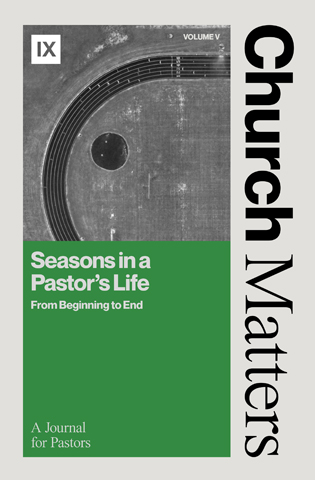Raise up Leaders
June 10, 2024

June 10, 2024
When I was a brand-new Christian, I remember wondering why Pastor Mark always insisted we go to Subway for lunch. How about some variety? Later on, I realized he was systematically building a relationship with the family behind the counter. He was also modeling intentionality and evangelistic faithfulness for me.
What Mark did for me is like what Jesus did with his disciples. He invested deeply in the Twelve and even more so in the Big Three (Peter, James, and John). It turns out this is a good model for any pastor trying to develop leaders—select a few promising men and invest deeply in them.
But what does this investment actually involve? Consider the following priorities.
In 2005, I accepted the call to be the pastor of Evangelical Christian Church of Dubai. There were six elders at ECCD when I arrived. They came from an array of theological backgrounds, including Brethren, Mennonite, charismatic, evangelical, and pragmatic. One elder also happened to be the pastor of a Mandarin-speaking church planted by ECCD. This conflict meant he never attended our church.
We were all over the place in our ministry philosophy and outlook. Some elders emphasized prayer walks, others organizational charts, others Christmas shoebox ministry for the poor. These brothers were sincere, but the church was weak.
To turn the ship around, we needed theologically grounded elders who could “give instruction in sound doctrine” (Titus 1:9). I began to pray for men whose main concern was not programs but equipping our members for the ministry of the church. I knew it was part of my job to see who God was working in and seek to raise those brothers up for pastoral ministry.
When a brother stood out from among the rest due to his love for the Word and our church, I would do any number of the following things:
By God’s grace, our church has since recognized 27 additional elders from eleven different nationalities. These men were diverse in ethnicity and cultural background, but increasingly united in doctrine and ministry philosophy. Serving alongside like-minded brothers like these is one of the greatest joys in ministry.
It’s the Holy Spirit’s job to make overseers (Acts 20:28). However, he often uses pastors to this end.
When I arrived at ECCD, the church staff were not on the same page. They were affable, energetic servants who were involved in church life, but they lacked a theologically shaped ministry philosophy. To make matters more challenging, I was never given a leadership mandate. The former senior pastor was still in the church, though in a different role. This meant the staff did not recognize my authority in shaping the public services of the church. Some even mocked my leadership and scorned my proposals.
But over time, this too began to change. For one thing, I assigned good books. In 2006, we began with D.A. Carson’s The Cross and Christian Ministry and Mark Dever’s Nine Marks of a Healthy Church. Then we read and discussed the following:
The tide began to turn. These books gave the staff a shared vocabulary. I would ask questions about the argument of the book, and then we would apply the book’s teachings to our ministry setting. Over time, these resources helped to shape our thinking in the areas of theology, pastoral ministry, counseling, and more. As a result, we grew in unity and ministry focus.
We also began weekly evaluations of our corporate gatherings. During Tuesday staff meeting, we would give specific feedback to everyone involved in the service—from preachers to service and song leaders to Scripture readers. These weekly course-corrections made us more ministry-minded and intentional in everything we did. It was especially useful for the staff to see me take seriously their criticisms and tips for improvement. Through their help, I became a better preacher. This exercise led to staff members growing spiritually, and we began pulling in the same direction.
Healthy churches often export surplus elders. Conrad Mbewe, whose church in Zambia has planted forty other congregations over the last three decades, has written, “It is the responsibility of church leaders to prayerfully identify those whom God is calling to this all-important work and to send them off.”11 . Conrad Mbewe, God’s Design for the Church, 157. Sometimes this means recruiting qualified candidates outside your church, training them, and appointing them as leaders of new work. More often, however, it involves recognizing qualified leaders the Lord has already raised up within your church. As two Australian pastors put it: “We should be talent scouts . . . constantly on the lookout for the sort of people with the gifts and integrity to preach the Word and pastor God’s people.”22 . Colin Marshall and Tony Payne, Trellis and the Vine, 139. See also the helpful list of qualities and characteristics that identify “people worth watching” on pp. 141–142.
In Dubai, we’ve rerouted several church members into missions and church planting work, including:
These were all fruitful members of our English-speaking church who had first moved to Dubai for work. Over time, they began to give evidence of pastoral gifting—a hunger for divine truth, a love for God’s people, an ability to teach, a positive spiritual impact on both church members and non-Christians. So we trained and redeployed them from within our church. The Lord of the harvest (Luke 10:2) had brought these men to ECCD, used ECCD to equip them, and then sovereignly redirect them.
When I first arrived in Dubai, I prioritized personal gospel outreach to people from the majority religion here. I spent lots of time evangelizing people at coffee shops, homes, or anywhere else I could interact with unbelievers. One time when I was back in the U.S. for a visit, a pastor asked me, “Are you spending time discipling and raising up future elders for the church?” It occurred to me that I had underemphasized leadership development, and that a long-term strategy of gospel growth required more leaders to shepherd the church and multiply our witness. One person can only do so much, but a whole church being led in the priority of evangelism can impact a city and the world.
Qualified leaders are crucial to healthy churches, and healthy churches are crucial to the advance of the gospel. In our case, it took years, but God raised up men from Asia, Africa, Australia, Europe, and America. Serving alongside them has deepened my faith, encouraged my soul, and helped to advance the gospel.

Different seasons impose different challenges and afford different opportunities. Brother, pastor, are you ready for the next season?
Go to Journal →